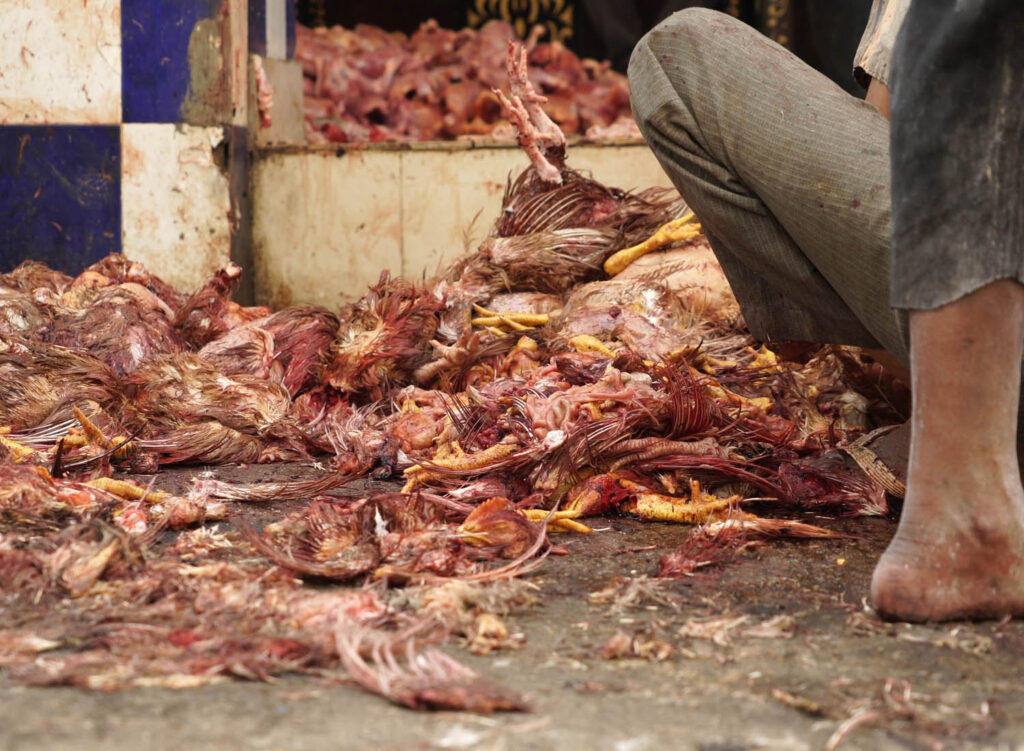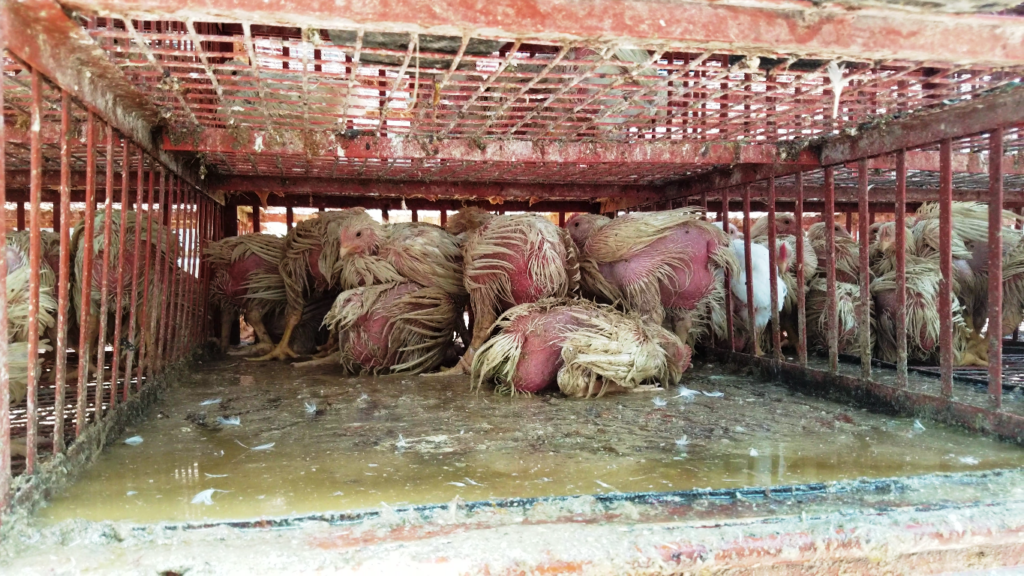Our Voice reaches the United Nations
At Animal Equality, our mission is to end cruelty to animals raised and killed for food. Over the last 15 years, our investigations have shown that farmed animals all over the world are in urgent need of help.
Through the course of our work, we’ve found a connection between animal abuse, human health, and our planet. This is especially the case of live animal markets, where live animals are transported, traded, and killed without protocols that prevent their suffering or the health of the people involved.

This is why we launched an international campaign to demand a ban on the sale and slaughter of live animals at markets around the world. Our petition addressed to the United Nations (UN) has garnered more than 569,000 worldwide signatures.
On June 17, 2021, the signatures were delivered to U.N. Secretary-General António Guterres, to the H.E. Mr. Munir Akram, President, U.N. Economic and Social Council c/o Permanent Mission of Pakistan to the United Nations and to the H.E.Nicolas de Rivière, U.N. Security Council President c/o Permanent Mission of the Republic of France to the United Nations.

We are asking the governing body to publicly acknowledge the risks live animal sales pose to global health and urging policymakers all over the world to restrict markets from selling live animals.
This international action marks a great milestone in the fight for animals. With the work that Animal Equality has done since its inception, we’ve collaborated with many important institutions. Today, we’ve contacted one of the most important organizations in the world with a message from animal protection activists like you asking that our cause be included in their global policy decisions. We have made farmed animals visible to these world leaders and have done so with your support.
As Sharon mentioned in her video, this incredible achievement would not have been possible without you. We’re very grateful for everything you’ve done for this campaign and for advocating for animals.
Actions like this one will make our world a better place for animals, and we hope we can count on your support again. Right now you can help us continue our life-saving work with a donation today. Together, we can change the world for animals!
LIVE ANIMAL MARKETS REVEALED
Public support for our campaign has been enormous, and the root of our effort began a few years ago.
It’s common when we’re investigating one situation, we’re led into another. That was the case during our investigation into chicken markets in India between 2017-2018. During the course of 6 months our investigators infiltrated farms and markets in the cities of Pune, Raigad, and Delhi.
As it happens in various countries around the world, chickens raised are often slaughtered at markets to meet the demand for fresh meat. This usually takes place at traditional live animal markets and consumers are accustomed to witnessing the deaths of the animals. In some cases, they can choose the animal they want while it’s still alive. This is exactly how some chickens are sold and killed in India.
Chickens in India’s live animal markets suffer due to overcrowding and are deprived of food and water, sometimes for days. Slaughter is carried out without stunning, with the animals left to agonize for minutes after their throats are slit. Aside from this cruelty, hygienic conditions are clearly insufficient to ensure that traders, visitors, and consumers are safe from diseases such as malaria and typhoid.
Coupled with the high popularity of these markets is the rise of chicken consumption in India that has been catastrophic for the animals; which is leading to more and more of them being raised, transported, overcrowded, and killed, and increasingly so at traditional Indian food markets.

OUR FIRST INVESTIGATION INTO THE CRUELTY OF LIVE ANIMAL MARKETS
Our investigators not just infiltrate intensive livestock farming facilities but also research, study and review materials that allow them to know and recognize situations that are illegal, cruel, but also potentially dangerous for humans and the planet.
That is why when they covertly visited the markets in Vietnam and China, they noticed that the situation was similar. In April 2020, our investigators revealed at the beginning of the COVID-19 health emergency that the sale and slaughter of animals in live animal markets was a public threat. These investigations were made possible by contributions to our organization that help provide the resources necessary for our investigators to do their work. Consider making a donation to ensure they can continue to do so.
Supported by footage, we again showed the unsanitary and cruel conditions of unregulated live animal markets. We also draw attention to the fact that wild and farmed animals are kept side by side in small cages—animals that in nature would never coexist together.
These animals suffer not only from mistreatment, but also from a weakened immune system from the stress of their transport, confinement, and unhygienic living conditions. Add to that the many shoppers that traffic the markets, you create the perfect breeding ground for animal-borne diseases that could make the jump to humans.
As you may recall during the early stages of the pandemic, there was much speculation about Asia’s live animal markets, and some experts pointed to the need to review these sites for safety.
Live animal markets exist all over the world, not just in Asia. That’s why Animal Equality has called for a worldwide ban on the sale and slaughter of live animals at wet or traditional markets.
In April of 2020, we launched an international campaign and petition asking for the ban. In our exclusive footage shot by investigators at live animal markets in China, Vietnam, and India, animals such as deer, raccoons, crocodiles, and dogs are shown living in filthy conditions, suffering from dehydration, starvation and disease.

DESPITE THEIR DANGER, LIVE ANIMAL MARKETS CONTINUE TO OPERATE
A few months later, we released a second investigation that revealed the markets’ threat to public health and safety was ongoing. Despite their danger, these places are still open to the public, drawing massive crowds of people, and worse, continuing to trade and brutally kill animals of all kinds.
Given this information, our petition took on greater urgency and we continued to collect signatures.
After a report by the World Health Organization (WHO), the World Organization for Animal Health (OIE) and the United Nations Environment Programme (UNEP) jointly called for the worldwide suspension of the sale of live wild mammals in traditional markets around the world due to the high risk they pose for disease transmission to humans, our urgency to create change increased.
While the report calls for wild animals to be spared, we believe that no animal should be subjected to cruelty at live animal markets. Upon delivering the over half a million signatures, we have asked the UN to ban the sale of all animals at the world’s live animal markets.

Once again, together we provide a voice to the animals that suffer the most and in the greatest number, ensuring that none are left behind. And as long as we have generous people like you on our side to help fund our work, we will continue to create a world where all animals are respected and protected.
